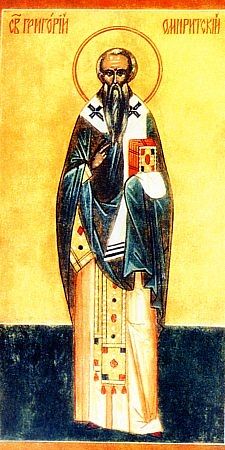Saint Gregory, Bishop of Homer (Omirits), the son of Agapius and Theodota, was filled with the grace of God and possessed gifts of healing and wonderworking even in his youth. The Providence of God led him to hierarchical service. While still a deacon at Mediolanum (Milan) he heard the foretelling of his destiny from a hermit, and then he received confirmation of these words from another spirit-bearing Elder who lived an ascetic life in the mountains.
When Gregory went to this holy schemamonk for guidance, a miracle occurred. As he approached the mountain, he saw a fiery column in the air. He soon realized that the fiery column was actually the man of God coming toward him. That night he saw the Elder standing in the air above the ground. The Elder revealed to Saint Gregory that he must go to Rome to pray in the church of Saints Boniface and Aglaida. Then he would go to Alexandria and to become a bishop. Then he would arrive in the city of Negran in the land of Homer (in southern Arabia) to proclaim the Gospel.
Saint Gregory felt himself unworthy of this, and wished to remain with the ascetic as his disciple. So that Gregory should have no doubts of the veracity of his words, the Elder revealed that he knew a secret about him. In a vision, Gregory had seen the First-Ranked Apostles Peter and Paul, and they had placed a bishop’s omophorion upon him.
Saint Gregory stayed a short time in Carthage (North Africa) serving as a deacon, then arrived in Rome. He went to the church of Saints Boniface and Aglaida, then to the tomb of Saint Peter. There he was granted a vision of the holy Apostle, who told him to walk the path of virtue and to live according to God’s will. That night he saw the Apostle Paul in a dream bringing to him a cup filled with oil, foretelling that he should receive the grace of the priesthood and the episcopacy.
During this time the armies of the Ethiopian emperor Elesbaan (October 24) vanquished the Himyarite king Dunaan, who was of Jewish background. The city of Negran was liberated, and Christianity restored in the land of Homer. But all the clergy had been cruelly exterminated by Dunaan, and therefore Elesbaan sent emissaries to the Patriarch of Alexandria asking him to send a bishop to Negran, and clergy for the churches. While he was praying, the holy Apostle Mark appeared to the patriarch, bidding him to find a deacon named Gregory, who was to be ordained to the priesthood, consecrated as a bishop, and then to be sent to Elesbaan. The patriarch did this. During the service a miracle took place. Saint Gregory’s face shone with the grace of the Holy Spirit, and from his vestments came a sweet fragrance like myrrh or incense, filling the whole church with the scent.
Arriving in Homer, Saint Gregory began to set the Church in order, preaching to both pagans and Jews. After three years Elesbaan returned to Ethiopia, leaving the noble Abramius behind as King of Homer. Saint Gregory crowned and anointed Abramius as king. Soon he issued a decree that all his subjects be baptized. Then certain prominent Jews turned to the emperor saying that it was better for people to believe willingly rather than under compulsion. They requested that he should permit a debate on faith to be held between them and the Christians, vowing that if the Christians proved victorious in this debate, the Jews would then accept Baptism.
The Jews were given forty days to prepare for the debate, which lasted for several days. Saint Gregory refuted all the arguments of the head of the Hebrew elder, Rabbi Ervan, using only texts from the Old Testament. In a vision Ervan beheld the holy Prophet Moses, who worshipped the Lord Jesus Christ. The prophet told Ervan that Ervan was in opposition to the truth and would be defeated.
By the grace of God Christian truth prevailed in the debate, but Ervan would not acknowledge his defeat. He made a last desperate attempt. He said, “If you want me to believe in your Christ, and to acknowledge that yours is the true God, then show Him to me, bishop!” The saint replied: “Your request is impertinent. It is not with man that you contend now, but with God. However, the Lord can do what you have asked in order to convince you.
Everyone waited to see what would happen. Saint Gregory, having steadfast faith in God and trusting in Him, began to pray aloud. He recalled the mystery of the Incarnation of God the Word, the miracles of His earthly life, the Three-day Resurrection and the Ascension into Heaven, and he invoked the power of the Life-Creating Cross. “Show Thyself to these people, O Lord,” he prayed, “and glorify Thy holy Name!”
When he finished the prayer, the earth quaked, and in the east the heavens were opened, and in a radiant cloud of light the Lord Jesus Christ came down on earth, and the Voice of the Lord was heard: “Through the prayers of Bishop Gregory, He Whom your fathers put to death will heal you.”
Like Saul, who was struck blind by the Heavenly light on the road to Damascus, the Jews were struck blind. Then they believed in Christ and they implored the holy bishop to heal them. Upon receiving holy Baptism, all of them were healed. Rabbi Ervan received the Christian name Leo (meaning “lion”).
After this most extraordinary miracle, Saint Gregory guided the flock of Homer for another thirty years. He reposed in the year 552 and was buried in a crypt in the cathedral of Afar.

